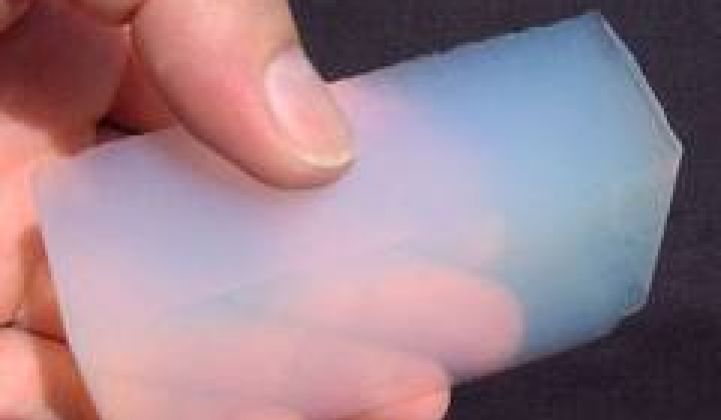BASF has joined the effort to make homes more energy efficient by joining investors in Apsen Aerogels.
The company has joined existing investors in a new $21.5 million round of funding for the company. Aerogels are essentially blankets of air pockets. Air doesn't transmit heat well, so materials that can capture and isolate air bubbles tend to insulate fairly well. The company has a famous demo where a blowtorch is applied to one side of an aerogel blanket. You can touch the other side and not get burned at all. (That's not a crazy form of clear tofu in the picture. It's an aerogel block.)
Unfortunately, aerogels historically have been somewhat expensive. Hence, aerogels have mostly been used in industrial applications like deep sea pipelines. Still, Aspen has been trying to lower the cost. For instance, the company takes a 10-millimeter-thick sheet of aerogels and tops it with drywall. The entire sheet is then installed over the top of existing walls made from bricks, cinder blocks, or cement. The insulating material, called Spaceloft, eliminates about a half-inch of floor space on each side of the room, but the material provides an insulation value of R10. Pink fiberglass often results in a far lower R4 insulation rating. Aerogels, of course, could also be used in place of pink fiberglass insulation on a retrofit and take up less volume in crawl spaces.
The company has also collaborated with Serious Materials on drywall/insulation products.
"In the U.K. there are 6.5 million solid wall dwellings," he said. "We take a minimal amount of space and are in and out in a day or two," CEO Don Young told us last year.
The company could also benefit from green housing regulations passed in North America and Europe. California aims to require builders to build only net-zero-energy homes by 2020 and net-zero-energy commercial buildings by 2030. While these net-zero structures will achieve that target with solar panels and fuel cells, a good portion of the energy savings will come from better insulation.
BASF's involvement further underscores the fact that conglomerates see green as a growth market. Panasonic has also begun to examine ways to deploy insulation used in household appliances, thin by nature and design, for walls.



